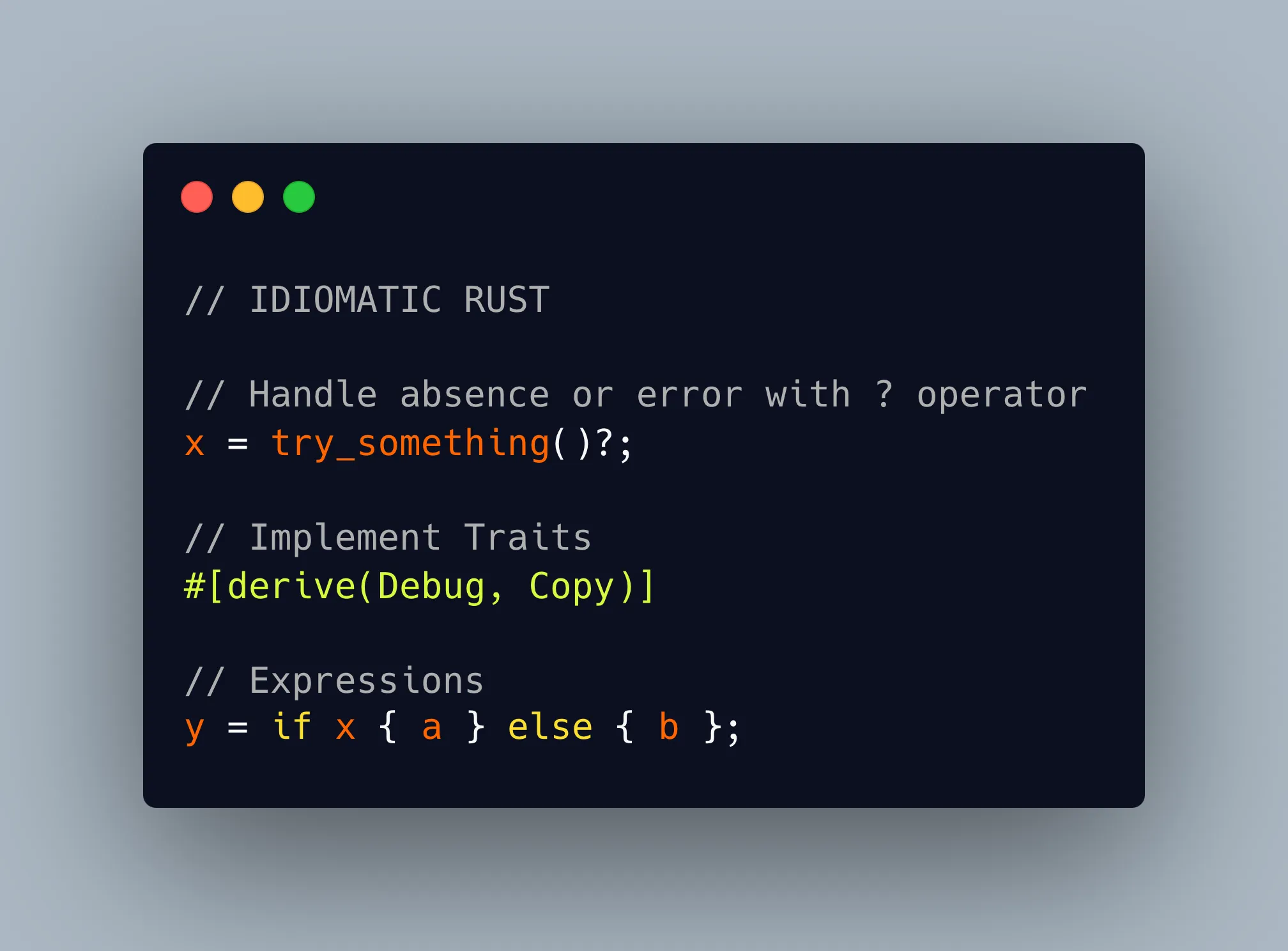Exploring the intersection of idiomatic Rust and functional programming
Welcome to the latest edition of Rust Trends, a newsletter dedicated to keeping you up-to-date on the latest developments and trends in the Rust programming language.
Today’s topics are:
- Idiomatic Rust
- Functional programming
- Cargo Fix
Let’s dive into today’s topics and discover the latest and greatest in the world of Rust programming!
Idiomatic Rust, what is it and why should I care?

Idiomatic Rust refers to the style of Rust programming that follows the language’s conventions and best practices, utilizing Rust’s unique features to write code that is safe, efficient, and expressive.
Some examples of idiomatic Rust code include:
- Using Rust’s ownership and borrowing system to ensure that memory is managed safely and efficiently
- Leveraging Rust’s iterators and closures to express complex behavior in a clear and efficient way
- Using the match expression to handle different cases in a concise and readable way
- Using conversion traits like From and Into
But why should you care about writing idiomatic Rust code? Firstly, idiomatic Rust code tends to be easier to read and maintain, both for yourself and for others who may work with your code in the future. It can also be more efficient, as Rust’s unique features like zero-cost abstractions and memory safety can be utilized to write high-performance code.
In addition, following Rust’s conventions and best practices can help you avoid common pitfalls and mistakes that can lead to bugs and security vulnerabilities. By utilizing Rust’s ownership and borrowing system, for example, you can avoid issues like null pointer dereferencing and memory leaks.
Furthermore, writing idiomatic Rust code can help you become a better Rust programmer. By understanding Rust’s unique features and conventions, you can become more proficient in the language and better equipped to write high-quality, efficient code.
If you are interested in learning more about idiomatic Rust, the Rust programming language website provides extensive documentation on Rust’s design philosophy and best practices, as well as tutorials on e.g. traits, cheatsheets, and examples of idiomatic Rust code. There are also many online communities and forums dedicated to Rust programming, where you can ask questions and share knowledge with other Rust programmers.
In conclusion, writing idiomatic Rust code can help you write more maintainable, efficient, and secure programs, and become a better Rust programmer overall.
Functional programming in Rust

Functional programming is a programming paradigm that emphasizes the use of functions to perform computations. In functional programming, functions are treated as first-class citizens, meaning that they can be assigned to variables, passed as arguments to other functions, and returned as values from functions. Functional programming also emphasizes immutability, meaning that data structures and variables should not be changed once they are created. Instead, new data structures and variables are created based on existing ones.
Rust provides a number of features that make functional programming easier, such as closures, iterators, and pattern matching. These features allow Rust programmers to write code that is both idiomatic and functional, using functions as building blocks to express complex behavior in a clear and efficient way.
For those interested in functional programming in Rust, there are several resources available as well. The Rust Programming Language book includes a chapter on functional programming, which provides an introduction to functional programming concepts and how they can be applied in Rust. Moreover, there are blog posts, like this and this.
Cargo Fix
In addition to its existing capabilities, the cargo fix subcommand now also supports automatically fixing some simple Clippy warnings. This means that developers can now rely on Cargo to handle even more of their code maintenance tasks, freeing up time for more important work.
To draw more attention to these increased capabilities, Cargo will now suggest running cargo fix or cargo clippy –fix when it detects warnings that are automatically fixable. For example, when a warning is issued for an unused import Cargo will suggest running cargo fix to fix the issue.
Overall, these updates to Cargo’s cargo fix subcommand are a welcome addition to the Rust ecosystem, making it even easier for developers to write clean and efficient Rust code. To use these great features make sure to upgrade to the latest version of Rust 1.69.0
Do not be afraid to try new things in Rust. After all, it is always good to step out of your comfort zone.
Thanks for reading!
Bob Peters
Feel free to connect with me on LinkedIn
